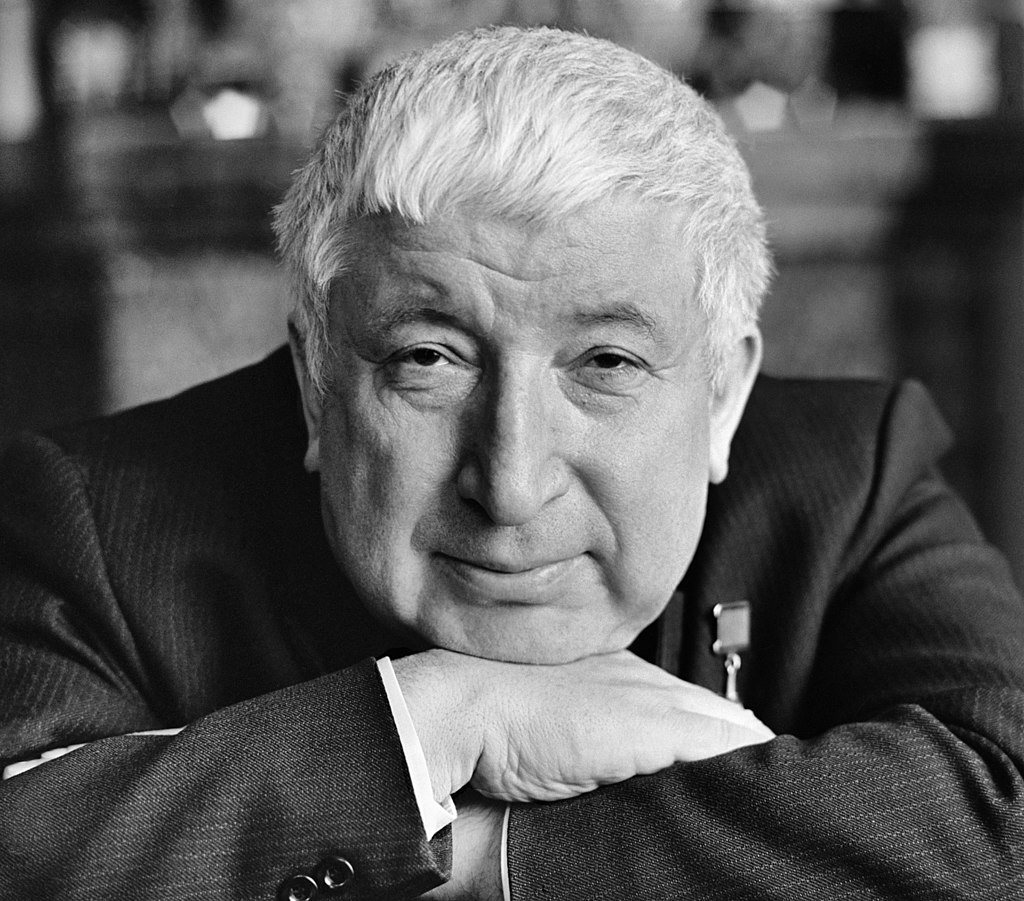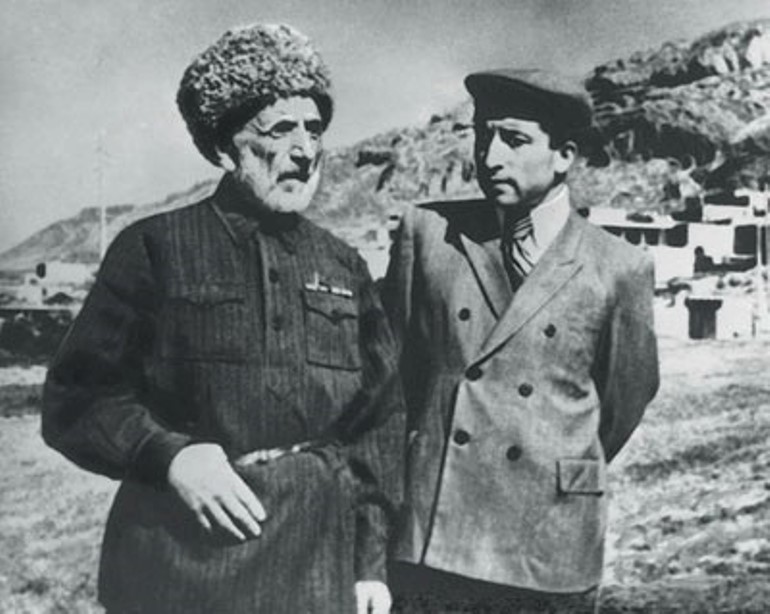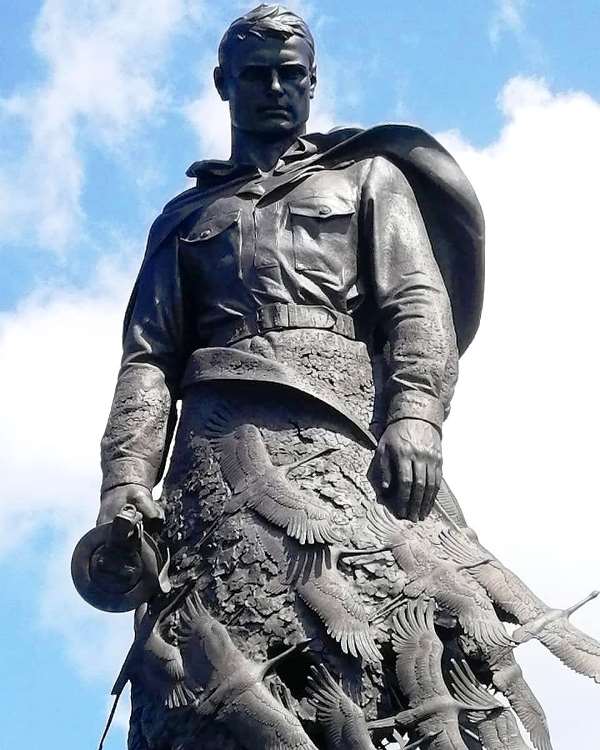
Proud of Our People! Rasul Gamzatov, Poetic Spirit of Dagestan
/ Главная / Russkiy Mir Foundation / Publications / Proud of Our People! Rasul Gamzatov, Poetic Spirit of DagestanProud of Our People! Rasul Gamzatov, Poetic Spirit of Dagestan

Rasul Gamzatov. Photo credit: Omarov M. / wikipedia.org
Rasul Gamzatov, a nationally acclaimed Avar poet, was born on September 8, 1923, 100 years ago. He was the author of "Cranes", perhaps the most touching song lyrics about war and fallen soldiers. Mr. Gamzatov did not write in Russian. Thus, we know his poetry through translations of other Russian poets. Nevertheless, one of his friends said, "Translators are unable to think up anything here".
Talented person from highland village
There is a good reason to describe Rasul Gamzatov as a phenomenon of the Soviet era. What would have been the path of a boy from a poor mountain settlement in Dagestan if he had not been born in the USSR? Would it have been possible for him to publish a book of poems at the age of 20? Would his works have been translated into 41 languages? Would the overall circulation of his books have reached 16 million copies? All these questions are obviously rhetorical.
The list of his awards and titles would take a whole paragraph. Rasul Gamzatov used to be a lucky person well-treated by the government and loved by the people. Rulers changed, countries passed into oblivion, yet Mr. Gamzatov was treated with the same profound respect.
He was born in the highland aul of Tsada, Dagestan, on September 8, 1923. His parents were peasants. However, his father was already known as a Dagestani folk poet. He used to write poems in the Avar language. Actually, he did not write but recited them as Avar writing system was introduced after 1917 as a result of the Soviet state's policy of preserving national languages. According to Rasul's memories, his father used to tell him self-authored fairy tales, poems, and stories, thus sparking a creative streak in him.
When the boy was 9 years old, he wrote his first poem. Back then, he saw an airplane for the first time in his life. Georgy Baidukov, a famous pilot of the Chkalov's Trio, visited the mountainous Dagestan. The boy's poetry was published in the district newspaper from time to time. Rasul came up with a pseudonym derived from his father's name - Gamzatov - to avoid his poems being confused with his father's works. The whole world would know him by that pseudonym.
Rasul Gamzatov did not go to war like many of his peers. The Dagestan administration asked the Moscow Government to exempt Rasul from call-up as one of his older brothers had already died near Sevastopol and the other died near Stalingrad. Thus, fate safeguarded him for the sake of poetry. In 1943, the young poet published Hot Love and Burning Hate, his first book of poems in the Avar language. It was dedicated to love for his motherland and hatred for the fascists who had invaded to occupy this land.
Once the book was published, the 20-year-old poet was accepted into the Union of Soviet Writers. In 1945, Rasul Gamzatov went to Moscow to join the Maxim Gorky Literary Institute. Truth be told, he made lots of mistakes in the Russian language spelling test at the admission. Nevertheless, Fyodor Gladkov, the Institute's rector, decided to accept the talented young man from Dagestan as a student.
Rasul Gamzatov never wrote poetry in Russian. He probably realized that it would be impossible to communicate the whole palette of his feelings and emotions with it. Yet, the Literary Institute opened the young Avar poet the way to the great poetry of the Russian world. He met and became lifelong friends with Yakov Kozlovsky and Naum Grebnev, poets who later became the main translators of Mr. Gamzatov's poems. It is because of the Russian language that Rasul Gamzatov's poetry is known all over the world.
"Translators are unable to think up anything here"
Avar poetry has no rhymes. It means that the translator's work is probably made somewhat easier. Yakov Kozlovsky, a lifelong friend of Mr. Gamzatov, commented on the translators' contribution to the final versions of the poems as follows: "What makes Rasul Gamzatov's poetry interesting is the spirit of Dagestan, which is always present irrespective of the topic. Translators are unable to think up anything here."
Mr. Kozlovsky was more than a mere translator. He was also a great expert on Dagestan, its customs and traditions, including its poetry. That is why, he also translated the poems by Gamzat Tsadasa, Rasul Gamzatov's father, as well as many other Dagestani poets. All those poets enjoyed nationwide recognition and fame. Furthermore, Mr. Gamzatov used to entrust his poems to translators who were approved by Yakov Kozlovsky. The latter's authority was unquestionable.

Gamzat Tsadasa and Rasul Gamzatov. Photo credit: wikipedia.org
Rasul Gamzatov understood the role of a poetry translator perfectly well and highly appreciated it. He used to joke about his friend Yakov Kozlovsky: "He translates me in such a way that later on when I translate it back into Avar, it turns out to be a completely different poem, much better than mine..." He also praised the translators' work in his articles and described it as an important state affair, "Translators do an important state job. They are literature servants, and we should talk about them respectfully. It is especially applicable to us, ethnic poets because their skillful hands and empathic hearts enliven our poems and ensure their original poetic expression in another language. This is a real blessing. As a result, highland poetry has acquired new features, and the ability to create expressive realistic scenes. Thus, our works have gained thousands of new readers. The translators have made Russian a second mother tongue for us.”
Having graduated from the Literary Institute in 1951, Mr. Gamzatov became chairman of the Union of Writers of Dagestan. He headed it for 50 years until his retirement in 2003. This persistence was quite reasonable and logical as none of the local poets could compete with Mr. Gamzatov in terms of prominence, fame, and power. Rasul Gamzatov traveled all over the world as the most striking embodiment of the friendship between the USSR's peoples. Furthermore, he used to take a shepherd's burka with him on all his distant business trips. "Why are there no buttons?" Fidel Castro once asked him. "So that I could quickly get a dagger,' Mr. Gamzatov replied without hesitation. "Excellent guerrilla clothes," Fidel praised him.
Rasul Gamzatov is remembered as an open, quick-witted, hospitable, and generous person. He liked to share some humorous episodes from his student period.
How Mark Bernes tweaked Rasul Gamzatov
"Cranes" is one of the most well-known, popular, and loved war songs in Russia and all over the world. The powerful image of fallen soldiers whose spirits fly off into the infinite sky like a flock of cranes was conceived by the poet during his trip to Japan. The Soviet delegation laid floral tributes at the monument to Sadako Sasaki. The girl was one of the Hiroshima nuclear explosion victims.
Like thousands of her compatriots, the girl got leukemia after the Americans had dropped atomic bombs on Hiroshima and Nagasaki. She believed that she would recover if she made a thousand paper cranes. Sadako used to receive handmade cranes from all over the world. Nevertheless, she died. Hundreds of women wearing white clothes (the traditional color of mourning in Japan) come to her grave on Memorial Day for the Atomic Bomb Victims. This scene and the story of the little Japanese girl deeply touched Rasul Gamzatov. Then he received a telegram about his mother's death. During the flight back, he was thinking of his older brothers and his mother who had waited for their return from the war in vain. This pain of loss fused with the story of the little Japanese girl and her cranes.
The lyrics was translated by Naum Grebnev, his friend, a fellow student at the Literary Institute, and a renowned translator of Middle Eastern poetry who had fought in the Great Patriotic War. After Mr. Grebnev's death in 1988, Rasul Gamzatov wrote this about his friend as follows, "My friend Naum Grebnev translated "Cranes" into Russian brilliantly. He was not just a translator but almost a co-author. He felt it better than any other poem because he was a wounded warrior who had lost his family and friends in the war. It expressed his personal pain. He used to say: "This poem is about me and my friends." Now I mourn for him too as he has also joined the crane flock".

Rzhev Memorial (2018). The monument to fallen soldiers is based on the image of cranes conceived by R. Gamzatov. Photo credit: Andrey Korobtsov/wikipedia.org
It should be mentioned that the original text was a bit different from the well-known version. It had the following lines: “I sometimes think that riders brave who met their death in bloody fight where never buried in a grave but rose as cranes with plumage white.” This version of the poem was published in the Novy Mir magazine in 1968. Mark Bernes saw it there. He immediately got in touch with the author. They agreed that he would give the poem to the composer Yan Frenkel. However, Mr. Bernes requested to change a few lines and replace "riders" with "soldiers". Thus, the final verse now reads as follows:
One day I’ll join the flock of cranes,
With them I shall go winging, by
And you, who here on earth remain,
Will hear my loud and strident cry.
Mark Bernes's widow recalled his fierce arguments with the translator who had opposed the idea of making changes to Mr. Gamzatov's poems. Finally, Mr. Bernes convinced both Mr. Grebnev and Mr. Gamzatov. It turned out that he was absolutely right. The song gained a truly global dimension in its new version. Furthermore, the composer spent two months before he managed to find the perfect music. When Mark Bernes heard it, he cried... Later, many mature men who had experienced the pain and violence of war cried listening to this requiem song. As for Mark Bernes, "Cranes" became his farewell to life. Back then he was severely ill, and his son used to take him to the studio to record the song. Mark Bernes recorded the song in one take, and a month later he died. It was as if he had drawn a final line…
The Union of Soviet Composers did not approve of the song at first. It was considered overly sentimental and "indulging the unsophisticated taste of the public". However, it proved to be the other way around. The poet, the translator, the composer, and Mark Bernes were able to reach and touch the sore spot in the hearts of all people affected by the war. It was not about sentimentality. People recognized the pain associated with the inevitable loss of life, its acceptance, and the understanding of its deep meaning. That's what people heard in the song. It became incredibly popular and adored in no time. Since that time, the image of cranes has become a symbol of fallen soldiers and found its rightful place on many military monuments. Even today, when there is a special military operation in Ukraine, a public monument to the fallen soldiers has been erected in Tuapse. It also features an endless flock of cranes flying into the sky…
Later on, songs with Rasul Gamzatov's lyrics were included in the repertoire of nearly all the leading Soviet performers, such as I Won't Forget You with Yuri Antonov, Sunny Days Have Gone with Valery Leontiev, Take Care of Your Friends performed by Muslim Magomaev.
Rasul Gamzatov had a truly happy life. He left the richest legacy, including 136 collections in Russian and 149 books in 41 languages with a total circulation of more than 16 million copies. He fell gravely ill almost immediately after the death of his beloved wife (her name was Patimat, and he used to describe himself as "Doctor of Patimatic Sciences"). He passed away three years later…
… I’ve seen the Hiroshima ash.
I’ve relished life as I take Ijeer:
The froth away I blew
And drank a life of toil and strife
That is not false—but true.
I love each day and, come what may,
I drain it to the dregs.
It’s life herself who is to blame
If my great thirst still begs.
I do not care if, thirst unslaked,
This world I have to quit—
Provided men, while Earth rotates,
Remain to thirst on it!
Poetry translation: Peter Tempest
New publications

 Mikhail Kalatozov, a director who transformed the world of cinematography in many ways, was born 120 years ago. He was a Soviet film official and a propagandist. Above all, he was capable of producing movies that struck viewers with their power and poetic language.
Mikhail Kalatozov, a director who transformed the world of cinematography in many ways, was born 120 years ago. He was a Soviet film official and a propagandist. Above all, he was capable of producing movies that struck viewers with their power and poetic language.  Ukrainian authorities have launched a persecution campaign against the canonical Ukrainian Orthodox Church (UOC), the biggest one in the country's modern history. Over the past year, state sanctions were imposed on clergy representatives, searches were conducted in churches, clergymen were arrested, criminal cases were initiated, the activity of the UOC was banned in various regions of the country, and monasteries and churches were seized.
Ukrainian authorities have launched a persecution campaign against the canonical Ukrainian Orthodox Church (UOC), the biggest one in the country's modern history. Over the past year, state sanctions were imposed on clergy representatives, searches were conducted in churches, clergymen were arrested, criminal cases were initiated, the activity of the UOC was banned in various regions of the country, and monasteries and churches were seized.  When Nektary Kotlyaroff, a fourth-generation Russian Australian and founder of the Russian Orthodox Choir in Sydney, first visited Russia, the first person he spoke to was a cab driver at the airport. Having heard that Nektariy's ancestors left Russia more than 100 years ago, the driver was astonished, "How come you haven't forgotten the Russian language?" Nektary Kotlyaroff repeated his answer in an interview with the Russkiy Mir. His affinity to the Orthodox Church (many of his ancestors and relatives were priests) and the traditions of a large Russian family brought from Russia helped him to preserve the Russian language.
When Nektary Kotlyaroff, a fourth-generation Russian Australian and founder of the Russian Orthodox Choir in Sydney, first visited Russia, the first person he spoke to was a cab driver at the airport. Having heard that Nektariy's ancestors left Russia more than 100 years ago, the driver was astonished, "How come you haven't forgotten the Russian language?" Nektary Kotlyaroff repeated his answer in an interview with the Russkiy Mir. His affinity to the Orthodox Church (many of his ancestors and relatives were priests) and the traditions of a large Russian family brought from Russia helped him to preserve the Russian language.

 The leaders of the Friends of the Great Russia cultural association (Amici Della Grande Russia) in Italy believe that the Western policy of abolishing Russian culture in Europe has finally failed. Furthermore, it was doomed to failure from the beginning.
The leaders of the Friends of the Great Russia cultural association (Amici Della Grande Russia) in Italy believe that the Western policy of abolishing Russian culture in Europe has finally failed. Furthermore, it was doomed to failure from the beginning.  Name of Vladimir Nemirovich-Danchenko is inscribed in the history of Russian theater along with Konstantin Stanislavski, the other founding father of the Moscow Art Theater. Nevertheless, Mr. Nemirovich-Danchenko was a renowned writer, playwright, and theater teacher even before their famous meeting in the Slavic Bazaar restaurant. Furthermore, it was Mr. Nemirovich-Danchenko who came up with the idea of establishing a new "people's" theater believing that the theater could become a "department of public education."
Name of Vladimir Nemirovich-Danchenko is inscribed in the history of Russian theater along with Konstantin Stanislavski, the other founding father of the Moscow Art Theater. Nevertheless, Mr. Nemirovich-Danchenko was a renowned writer, playwright, and theater teacher even before their famous meeting in the Slavic Bazaar restaurant. Furthermore, it was Mr. Nemirovich-Danchenko who came up with the idea of establishing a new "people's" theater believing that the theater could become a "department of public education."  "Russia is a thing of which the intellect cannot conceive..." by Fyodor Tyutchev are famous among Russians at least. December marks the 220th anniversary of the poet's birth. Yet, he never considered poetry to be his life's mission and was preoccupied with matters of a global scale. Mr.Tyutchev fought his war focusing on relations between Russia and the West, the origins of mutual misunderstanding, and the origins of Russophobia. When you read his works today, it feels as though he saw things coming in a crystal ball...
"Russia is a thing of which the intellect cannot conceive..." by Fyodor Tyutchev are famous among Russians at least. December marks the 220th anniversary of the poet's birth. Yet, he never considered poetry to be his life's mission and was preoccupied with matters of a global scale. Mr.Tyutchev fought his war focusing on relations between Russia and the West, the origins of mutual misunderstanding, and the origins of Russophobia. When you read his works today, it feels as though he saw things coming in a crystal ball...